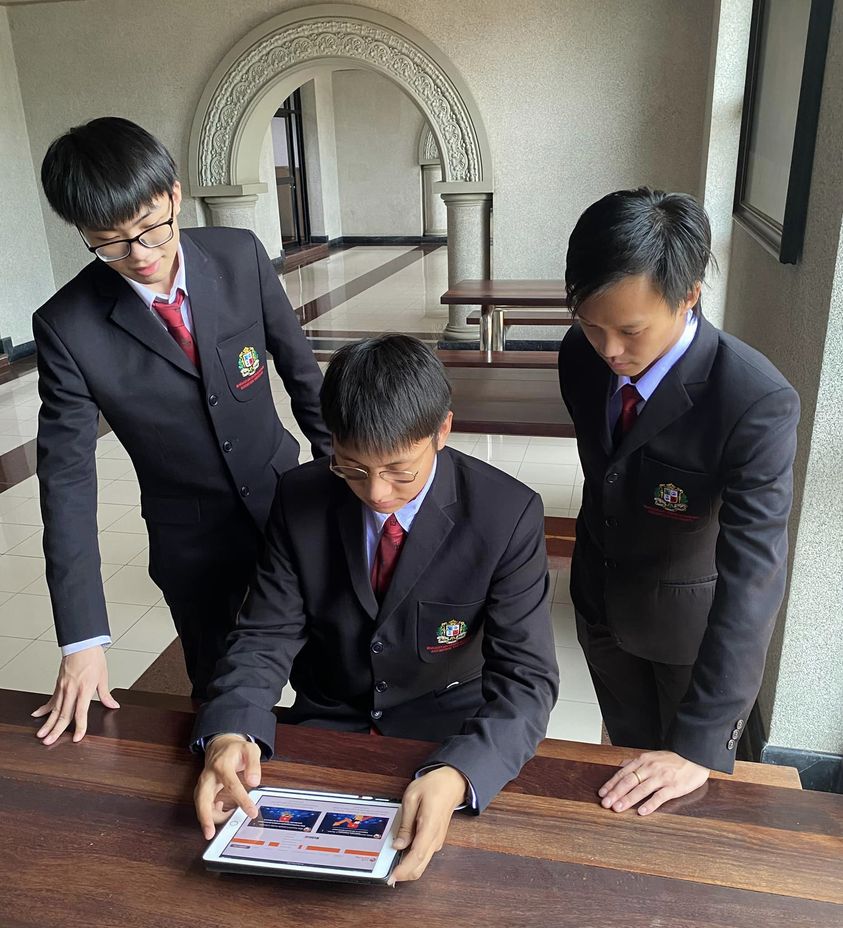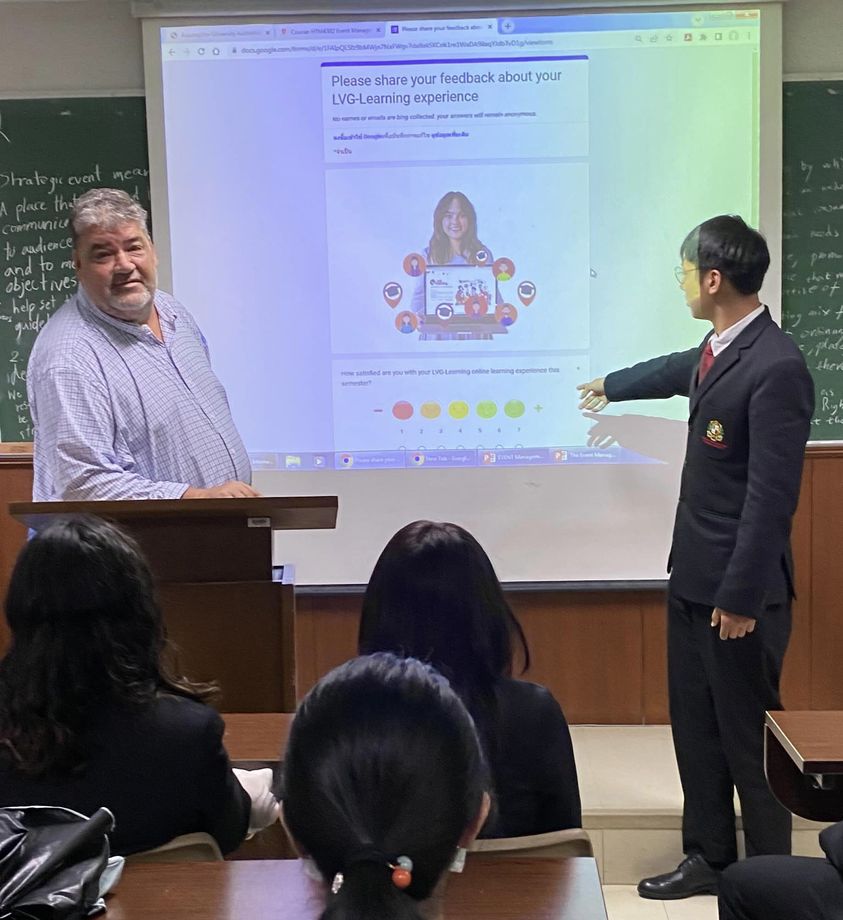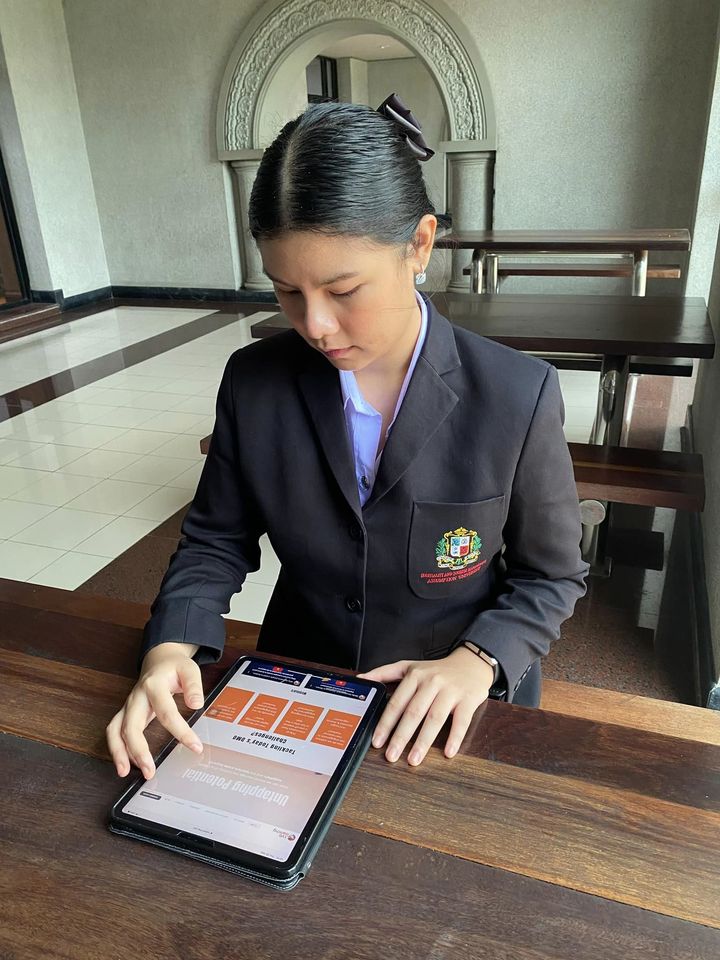
MSME Business School Signs MOU with LVG Learning
E-learning was the focus of a recent MOU signed by Seda Caylak, CEO of LVG Learning and Dr. Scott Michael Smith from the Department of Hospitality and Tourism Management, MSME Business School, Assumption University, Thailand. Assumption University partnered with London- based LVG Learning to provide tourism students access to destination courses, business skill courses, soft skill courses and webinars from the leaders in the tourism industry as part of a recently signed Memorandum of Understanding (MOU) aimed at addressing, through e-learning, the practical knowledge and skill gaps existing in the tourism industry today.
This partnership began with an introduction from Andrew J Wood, President, SKAL International Asian Area. Skål International is a professional organization of tourism leaders worldwide, promoting global tourism and friendship. Andrew saw an opportunity for tourism students to use the LVG Learning platform to increase their knowledge and skill set. Andrew explained, “Modern learners, especially millennial and generation Z learners, tend to prefer learning customized to their needs, informal in style, and available on demand. E-learning affords tourism students and young professionals the freedom to fit education into their busy lives.”
The Purposes of this MOU are;
- To provide online courses to Assumption University undergraduate students and faculty related to hospitality and tourism studies.
- To collaborate with destination management organizations (DMO) and national tourism organizations (NTO) on projects to support students’ practical knowledge of destinations, destination marketing and destination management.
Expected Outcomes include;
- To enable students to meet companies and leaders in the tourism industry to explore various career options and gain practical on-the-job experience and potential job opportunities for their careers.
- To prepare digital destination content with the sponsorship of regional promotion offices and to support students in transforming destination marketing into digital tourism management.
- To support AU students through educational journeys to digital change in tourism.
Dr. Scott found his students appreciated the learning experience this semester as the campus cautiously returned to on-site classes this semester. Scott said, “The student feedback has been great. The students responded well to the content, and the vast majority of students completed more courses than required.” Students completed destination learning courses and business/soft skills courses outside of class time, at their convenience and on the devices they preferred.
The destination learning journey courses included destinations such as; Budapest, Dubrovnik, Florence and Sarawak. Senior product professionals develop the Destination Learning Journeys at national tourism organizations (NTO), destination management organizations (DMO) and convention and visitor bureaus (CVB) using the latest ed-tech instructional design strategies. “The destination learning course improved my knowledge about travel destinations, and it was fun.”, said tourism student Mr. Shin Thant Lu.
The business skill courses focused on practical and accessible skills development, offering courses such as Key Elements of Business Execution and Writing Effective Emails. Business skill courses brought together tourism knowledge, expertise and ideas. “I liked the content, and I can learn a lot of new knowledge and skills. LVG teaching videos are self-explanatory, which makes it easier for me to understand the key knowledge.”, said HTM student Mr. Kaizhu LuoSang.
For this project, Dr. Scott closely followed students’ progress with the help of comprehensive user and summary reports generated by LVG Learning. Dr. Scott also administered in-class surveys and student focus groups to measure student engagement and satisfaction. “Student satisfaction was 90% which is very high for a homework assignment.”, said Dr. Scott, continuing with a smile, “The average length of time students spent on this e-learning activity was 2 hours and 24 minutes. Courses such as Becoming a Great Listener and Being an Effective Team Member were among the most popular and taught these future leaders soft skills focused on their personal life and career goals. Student feedback indicated that the students liked choosing topics of interest and learning at their own pace. Dr. Scott tells students that their knowledge will get them the job, and their soft skills will get them promoted. “The courses focusing on student’s soft skills and professional development were a welcome addition to the lesson plans this semester.”, said Dr. Scott.
Mr. Kotchasorn Khewsanit, studying in the HTM program, said, “I liked the soft skill courses the most. It would be great if they could be incorporated into future HTM coursework. I liked accessing the courses at my convenience on my mobile devices (tablet and phone).”
LVG Learning’s CEO, Seda Caylak, added, “This relationship between academia and commerce is much needed in the visitor economy. We are delighted to bring the world’s first Learning Experience Platform created by tourism professionals for tourism professionals. It marks a new and exciting chapter in helping tourism and hospitality staff, academics and students keep ahead of the game. Global tourism has had a tough few years, and it’s time to bounce back stronger and more productive by caring for both business development and talent retention in the same phase. This MoU highlights the commitment of the Department of Hospitality and Tourism Management and LVG Learning to ensure the next generation of tourism leaders can fulfill their and their organization’s potential. I am especially grateful to Dr. Scott Michael Smith for his counsel and support for this initiative.”
“Education’s purpose is to replace an empty mind with an open one.”, said Malcolm Forbes. The average person will make 5 to 6 career changes in their lifetime. Each of these will require up-skilling/re-skilling. A United Nations World Tourism (UNWTO) survey identified four key areas where travel enterprises focus their professional and educational development in the future; IT, customer service, data analytics and leadership. Dr. Scott said, “Tourism industry leaders can use the power of online learning technologies to build a more motivated, skilled and resilient workforce. Although, the responsibility lies with individuals to manage their careers, which will require a commitment to lifelong learning.”
LVG Learning uses the latest innovations in “ed-tech” to bring inspiring educational content to business-to- business (B2B) travel professionals and students. LVG Learning uses e-learning techniques like microlearning to harness user engagement. E-learning affords people the freedom to fit education into their busy lives at a time and place that suits them. Microlearning is a quick and effective way of learning which offers digestible information and, when combined with e-learning, offers; What learners need, when they need it and where it is needed. “Microlearning does not mean the course is short. It is the method of splitting the contents into pieces where independent learning units work for a single purpose and are part of the total learning journey. “10 minutes per day is the smartest way to be the expert.’ said LVG Learning’s Bige Cetinoglu.


